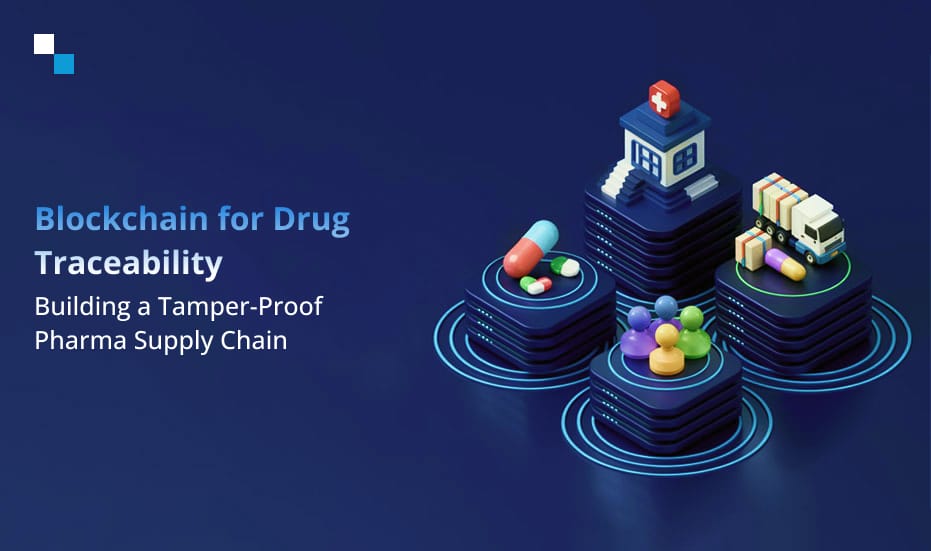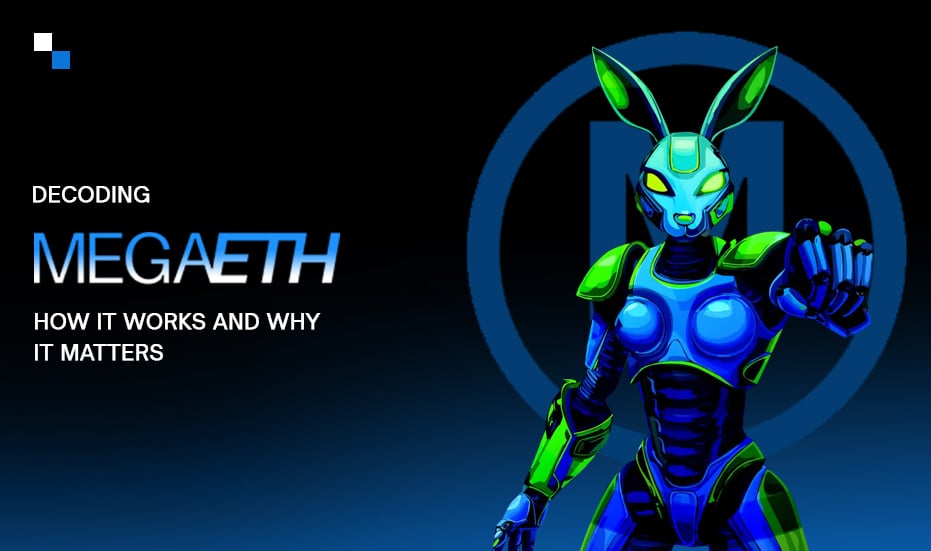
How to Choose the Right Neo Banking as a Service Provider for Your Business Needs?
April 11, 2025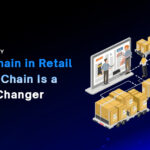
Top 10 Benefits of Blockchain in Retail Supply Chain You Should Know in 2025
April 14, 2025Imagine a scenario, a life-saving drug arrives at your hospital’s pharmacy. It seems legitimate. It has the right label with accurate packaging and a trusted distributor’s name. But what if, without your knowledge, that drug was fake, mishandled, or stolen in the supply chain? This is not fiction.
“The World Health Organization estimates that 1 in 10 medical products in low and middle-income countries are substandard or falsified, resulting in over 1 million deaths every year.”
Healthcare providers serve as the primary line of defense in ensuring patient safety and care integrity. In 2025, the most powerful tool to protect patients and stop counterfeit drugs dead in their tracks is using blockchain for drug traceability.
In this blog, we delve into the underlying challenges of the pharmaceutical supply chain and explore how blockchain healthcare solutions can strengthen transparency and traceability across the ecosystem.
The Dark Reality of Pharma Supply Chains
The pharmaceutical supply chain connects manufacturers, warehouses, distributors, and pharmacies across different countries. However, this complex network has many blind spots.
According to an estimation by the World Health Organization, half of the medicines sold on the web are fake. Criminal networks exploit fragmented, paper-based supply chains to insert fake, expired, or tampered drugs, which risk lives and damage healthcare providers’ trust.
So, healthcare providers have a choice in 2025. Either continue fighting an uphill battle with outdated tools or leverage blockchain for drug traceability and achieve 100% transparency across the pharma supply chain.
Blockchain for Drug Traceability- The Ultimate Solution to Counterfeit Medicines
Embracing blockchain for drug traceability refers to using decentralized, immutable ledgers to record every step of a pharmaceutical product’s journey, from manufacturing to the end consumer. All stakeholders, including manufacturers, distributors, regulators, and healthcare providers, using blockchain can:
- Track and verify every movement of a drug in real time.
- Prevent counterfeiting by validating product authenticity.
- Ensure compliance with global drug traceability regulations.
- Enhance patient safety through transparent sourcing.
The Growth
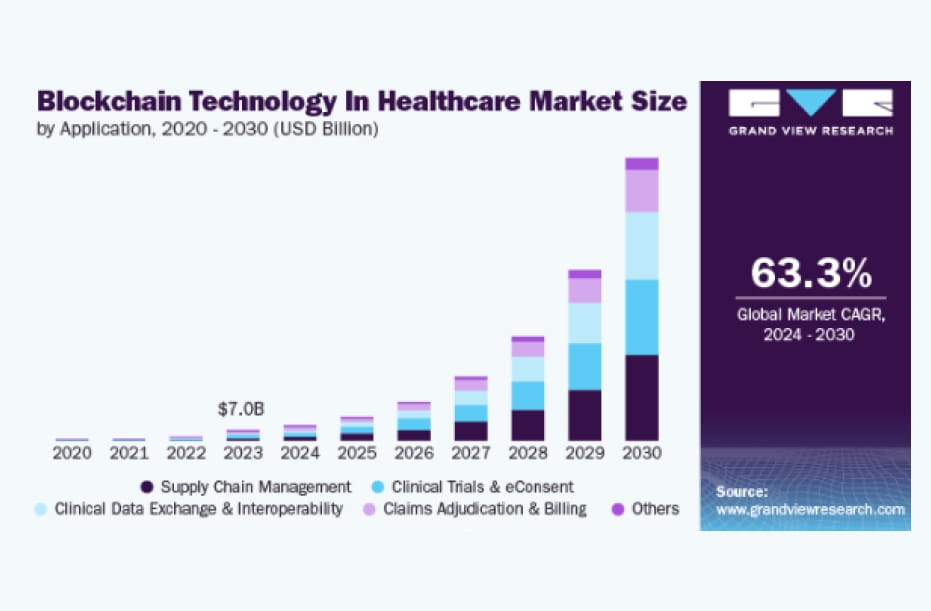
According to MarketsandMarkets, the global blockchain technology in healthcare market size was estimated at USD 7.04 billion in 2023 and is expected to grow at a CAGR of 63.3% from 2024 to 2030. The increasing incidence of healthcare data breaches, the increasing threat of counterfeit drugs, the increasing adoption of blockchain as a service (BaaS), and the transparency & immutability of the distributed ledger technology are the significant factors driving the growth of the market.
Why Now is the Right Time to Invest in Blockchain for Drug Traceability?
1. Regulatory Mandates Are Tightening
Many regulatory bodies, including the U.S. Drug Supply Chain Security Act (DSCSA) and European Union Falsified Medicines Directive (FMD), have set stringent deadlines for end-to-end pharmaceutical traceability. Blockchain offers the best-fit architecture to meet these mandates securely and efficiently. Healthcare providers who fail to comply risk legal penalties and reputational damage.
2. The Complexity of Pharma Supply Chains
The pharmaceutical supply chain involves multiple intermediaries, including:
- Raw material suppliers
- Manufacturers
- Distributors
- Logistics providers
- Pharmacies
- Healthcare institutions
This complexity increases the risk of information silos and tampering. Drug traceability using blockchain simplifies this chaos by creating a single source of truth accessible to authorized parties at every stage.
3. Counterfeit Drug Market Is Booming
Substandard medicines can exacerbate illnesses, lead to prolonged suffering, and contribute to drug resistance, making diseases harder to treat. Healthcare providers are the last line of defense between counterfeit products and patients. Blockchain for drug traceability can protect patients and healthcare providers by:
- Ensuring that only verified drugs reach patients.
- Automating alerts for suspicious supply chain activities.
- Enabling instant recalls for contaminated or counterfeit batches.
4. Demand for Real-Time Traceability
Post-COVID, patients and healthcare institutions demand greater transparency in how drugs are sourced and distributed. Drug traceability using blockchain supports real-time access to data and ensures that healthcare providers can verify a drug’s origin instantly. This one smart move of using blockchain for drug traceability boosts patient trust and helps build a healthcare ecosystem where every medicine reaching to patient is completely safe to consume.
How Does a Blockchain-Powered Pharma Supply Chain Enable Drug Traceability?
The pharmaceutical supply chain is complex, involving many players like manufacturers, logistics companies, distributors, hospitals, pharmacies, and patients. This complexity often leads to challenges like counterfeit medicines, lack of transparency, and poor traceability.
Blockchain supply chain solutions can fix these problems by making the entire process transparent, secure, and easy to track. Here’s how it works step by step:
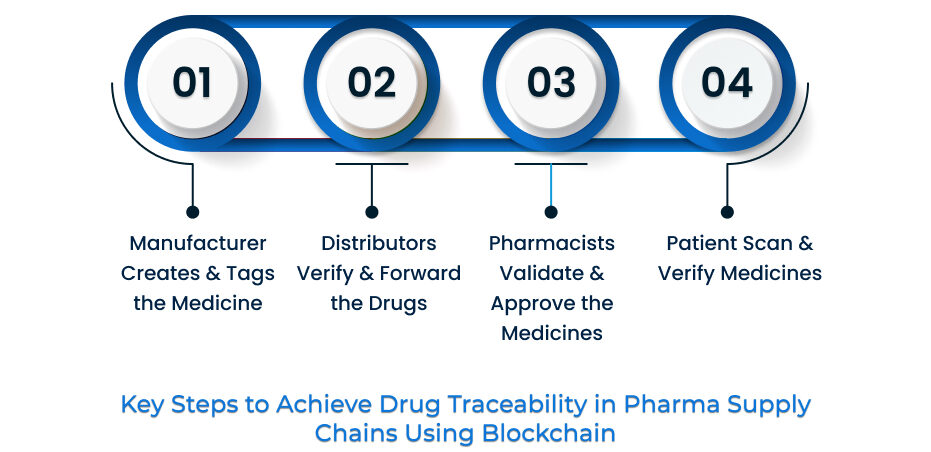
Step 1: Manufacturer Creates & Tags the Medicine
- The process starts when the manufacturer produces the drugs. Each medicine pack is labeled with a unique QR code.
- This QR code includes details, such as product name, date & place of manufacturing, expiry date, batch number, timestamp, location, and more. All this information is stored on the blockchain.
- Once added, a unique Hash ID is generated for each drug, which can be used to verify its authenticity at any stage.
Additionally:
- Medicines are shipped via IoT-enabled vehicles with temperature sensors for sensitive drugs (cold-chain shipping).
- Real-time data about temperature and location can also be stored on the blockchain.
- If there’s ever an audit, authorities can instantly check if the medicine was stored and transported under the right conditions.
Step 2: Distributors Verify & Forward the Drugs
Once the logistics service delivers the medicines to distributors:
- Distributors use the Hash ID to verify the origin and manufacturing details.
- They check if the drugs passed the necessary quality checks.
- If everything is valid, distributors digitally sign the transaction, confirming receipt.
- This information is stored on the blockchain.
- After verification, distributors forward the drugs to hospitals and pharmacies.
Step 3: Pharmacists Validate & Approve the Medicines
Hospitals and pharmacies receive the drugs and:
- Verify the QR code/Hash ID to trace back the source.
- If the drugs’ information is valid and matches the blockchain data, they approve the transaction.
- If any unauthorized distributor or counterfeit drug is detected, the transaction is automatically rejected.
- Only authorized participants with valid credentials can process transactions.
This helps immediately detect any fake or tampered drugs.
Step 4: Patient Scan & Verify Medicines
Finally, when a patient buys the medicine:
- They can scan the QR code on the packaging using a mobile app.
- The app will show the complete history of the medicine — where it was made, how it was transported, and which distributor and pharmacy handled it.
- This ensures that the patient is buying authentic, safe, and approved medicine.
Patients can also leave feedback or ratings for the medicine, which will be stored on the blockchain. These ratings can help other patients and healthcare providers make informed decisions.
Key Benefits of Using Blockchain for Drug Traceability
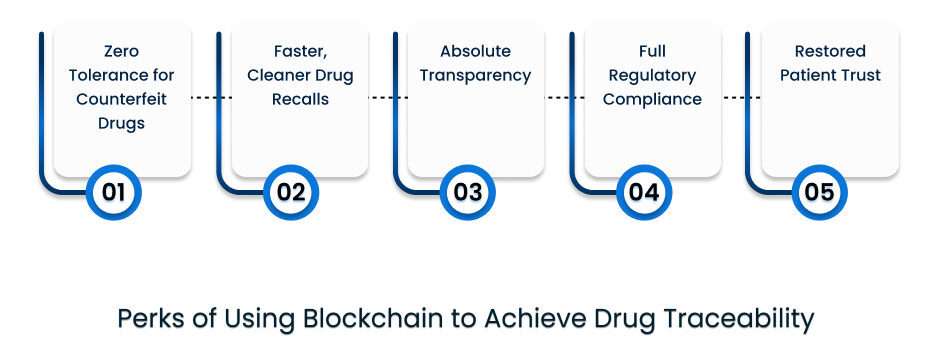
-
Zero Tolerance for Counterfeit Drugs
Blockchain creates an immutable digital trail for every drug. Hence, it is nearly impossible for counterfeit products to infiltrate your supply chain. If blockchain is used in the pharma supply chain, the counterfeiting issue can be reduced to a great extent.
-
Faster, Cleaner Drug Recalls
With blockchain supply chain solutions, healthcare providers can instantly trace contaminated or faulty drugs back to their source. The process used to take weeks now takes minutes. It reduces patient risk and financial losses while eliminating the panic of manual, paperwork-driven recall processes.
-
Absolute Transparency
Blockchain healthcare solutions ensure every transaction in the drug supply chain is visible to authorized stakeholders in real time. Manufacturers, distributors, regulators, and healthcare providers all access the same, verified data. It removes information silos, middlemen manipulation, and unauthorized alterations.
-
Full Regulatory Compliance
Global regulations demand strict end-to-end traceability. Blockchain automates compliance checks, provides immutable audit trails, and simplifies reporting, which helps healthcare providers avoid legal penalties, operational disruptions, and multi-million-dollar fines due to non-compliance.
-
Restored Patient Trust
In an era of increasing patient awareness, blockchain empowers healthcare providers to prove a drug’s authenticity instantly. This transparency fosters patient confidence, strengthens healthcare credibility, and positions your organization as a trusted leader in delivering safe, verifiable medications.

What Happens If Healthcare Providers Don’t Act?
Healthcare providers who fail to adopt blockchain for drug traceability will face:
- Compliance risks
- Financial losses due to counterfeit drug-related incidents.
- Damaged patient trust stemming from traceability failures.
- Slower, chaotic product recalls
- Erosion of the patient’s trust
- Operational inefficiencies in tracking, verification, and recall processes.
The way drug counterfeiting is booming, the demand for blockchain for drug traceability will no longer remain optional. It will become a necessity in the future to combat this critical issue in the pharma supply chain.
Conclusion: How Antier Can Help You Lead the Blockchain Revolution
The pharmaceutical industry’s future will be shaped by its ability to deliver safe, authentic drugs through transparent, compliant systems. In 2025, the most successful healthcare providers will be those who proactively embrace blockchain for drug traceability to ensure patient trust, operational efficiency, and regulatory compliance.
At Antier, we specialize in providing end-to-end blockchain healthcare development services tailored to your specific needs. Our expertise spans custom blockchain solution development, integration with your existing healthcare systems, compliance-focused smart contract development, data security & interoperability consulting, and more, under one roof. With a proven track record in delivering cutting-edge blockchain healthcare solutions, Antier can help your organization:
- Secure your pharmaceutical supply chain
- Simplify compliance with evolving global regulations
- Protect your patients from counterfeit drugs
- Improve operational efficiency through automation and transparency
Don’t wait for regulatory deadlines to catch you off guard. Lead the transformation in drug traceability today. Reach out to Antier and explore how our blockchain expertise can help your healthcare organization build a safer, smarter, and more compliant future.
